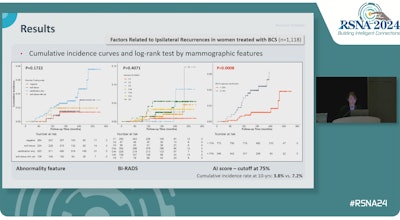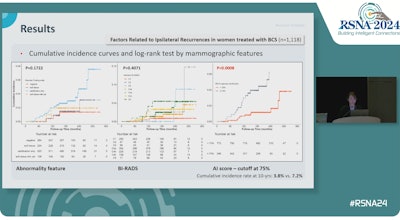AI scoring for assisting mammography interpretation can help predict recurrences in women treated for ductal carcinoma in situ (DCIS), suggest findings presented December 5 at RSNA 2024.
Jung Hyun Yoon, MD, PhD, from Yonsei University in Seoul, South Korea, presented her team’s findings showing that AI scores in the upper quartile can predict ipsilateral recurrences after DCIS treatment. This especially goes for women who had breast-conserving surgery, but not for those with contralateral second breast cancers.
“Cumulative incidence rates for ipsilateral recurrence during postoperative surveillance are significantly higher for DCIS presenting with scores at or greater than 75% on preoperative mammography,” Yoon said.
While DCIS cases make up between 20% and 30% of screen-detected breast cancers, they have excellent prognosis after treatment. Surgical excision is the standard of care for DCIS. This is meant to prevent the development of invasive breast cancers and minimize the risk of developing second cancers.
Local recurrence of DCIS is tied to the presence of symptoms, larger size, and higher nuclear grade. Suspicious features observed on screening mammography are associated with lesion aggressiveness. However, there is interobserver variability among radiologists when it comes to describing these mammographic features, Yoon said.
Yoon and colleagues studied whether AI scoring on preoperative mammography, along with clinical and radiologic factors, is associated with recurrence after DCIS treatment.
 Jung Hyun Yoon, MD, PhD, from Yonsei University in Seoul, South Korea presented her team’s findings at RSNA 2024. The researchers found that AI scores from a commercial system can predict ipsilateral recurrences after DCIS treatment.
Jung Hyun Yoon, MD, PhD, from Yonsei University in Seoul, South Korea presented her team’s findings at RSNA 2024. The researchers found that AI scores from a commercial system can predict ipsilateral recurrences after DCIS treatment.
The multicenter, retrospective study included data collected between 2012 and 2017 from 1,740 women with an average of 51.5 years who were treated for DCIS. The researchers analyzed preoperative routine mammograms via a commercially available AI algorithm (Lunit Insight MMG, Lunit). The system assists mammography interpretation by providing marks and corresponding abnormality scores ranging from 0% to 100% per view.
Of the total women, 35 (2%) had ipsilateral recurrences and 25 (1.4%) had contralateral breast cancer, while 1,680 (96.6%) were recurrence-free. Also, the average surveillance interval for women without recurrence was 81.5 months while the average interval from DCIS treatment to recurrence was 94.5 months.
The team found that average AI scores were significantly higher in ipsilateral recurrences (66.9 vs. 46.4 in nonrecurrence cases, p = 0.003). However, the same did not go for contralateral second cancers (p = 0.197). The recurrence-free survival rate meanwhile was significantly lower in ipsilateral recurrences for DCIS with AI scores greater than 75% (p
On multivariable analysis, the researchers observed the following factors that were significantly tied to ipsilateral recurrence: younger age (odds ratio [OR], 0.92; p
Finally, the team showed similar trends among women with breast-conserving surgery (n = 1,118). However, AI scores did not show a significant association with contralateral second cancers, regardless of surgery type.
Yoon said that based on these results, more aggressive treatment may be considered in women diagnosed with DCIS showing AI scores at or greater than 75% on preoperative mammography.
For full coverage of RSNA 2024, visit our RADCast.

Whether you are a professional looking for a new job or a representative of an organization who needs workforce solutions - we are here to help.